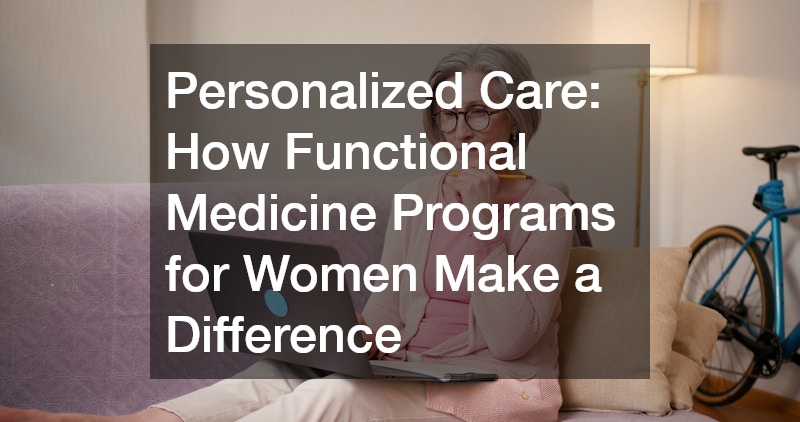
The realm of healthcare is continuously evolving to meet the unique needs of various patient demographics. One such evolution is the advent of functional medicine programs specifically tailored for women. Functional medicine emphasizes personalized care, focusing on the individual as a whole rather than merely addressing symptoms. These programs consider the complex hormonal, psychological, and physiological factors that affect women’s health. As awareness grows, it becomes increasingly vital to understand how these specialized programs make a substantive difference in women’s healthcare journeys.
Comprehensive Evaluation and Diagnosis
Functional medicine programs for women begin with a comprehensive evaluation and diagnosis. This thorough process delves into a woman’s complete medical history, lifestyle, and genetic predispositions. Unlike conventional healthcare approaches that may overlook subtle yet crucial details, functional medicine emphasizes a meticulous examination. Such detailed assessments allow healthcare practitioners to identify underlying causes of health issues unique to women, such as hormonal imbalances or nutrient deficiencies. This comprehensive evaluation forms the foundation for a personalized treatment plan tailored to each woman’s specific needs.
During the diagnostic phase, functional medicine practitioners engage in detailed consultations with their patients. These discussions are designed to understand a woman’s specific health objectives and concerns which may not be evident in traditional clinical settings. Such interactions foster a strong patient-practitioner relationship, crucial for effective treatment. By valuing patient input and considering individual health histories, functional medicine practitioners provide a more rounded and personalized approach to diagnosis. This patient-centric model helps in crafting solutions that have a higher potential for success.
Personalized Treatment Plans
The cornerstone of functional medicine programs for women lies in their ability to devise personalized treatment plans. These plans are not one-size-fits-all, but carefully tailored according to the specific needs and health conditions of each patient. By scrutinizing every detail obtained during the comprehensive evaluation, practitioners can create tailored interventions. This includes dietary recommendations, lifestyle adjustments, targeted supplements, and, when necessary, specific medical treatments. Such personalized care ensures that women receive the most appropriate and effective interventions for their unique situations.
Customized treatment plans acknowledge and respect the diversity in women’s health concerns. For instance, conditions like polycystic ovary syndrome (PCOS), thyroid irregularities, and menopause manifest differently in each woman. By addressing these issues on an individual level, women receive interventions that resonate with their personal health stories. This strategic personalization enhances patient compliance, as women are more likely to adhere to interventions that suit their specific circumstances and lifestyles. As a result, outcomes are positively impacted, leading to sustained health improvements.
Emphasis on Preventative Care
One of the significant advantages of functional medicine programs for women is their strong emphasis on preventative care. Unlike traditional health systems that often react to diseases once they manifest, functional medicine aims to prevent conditions before they arise. This proactive stance is transformative in the realm of women’s health, where early intervention can make a crucial difference. Functional medicine concentrates on identifying health risks through comprehensive screenings and lifestyle assessments. By addressing these risks early, women are safeguarded against potential health challenges in the future.
Preventative care in functional medicine is about fostering a forward-thinking healthcare model. It equips women with the knowledge and tools necessary to maintain their health proactively. Education plays a critical role here, as women are taught about their bodies and the factors that potentially influence their health. With this information, they are empowered to make informed health choices, aligning with the philosophy of patient empowerment. This education-driven model ensures that women are not passive recipients of care but active participants in maintaining their well-being.
Impact of Functional Medicine Programs on Women’s Health
Functional medicine programs for women are instrumental in driving positive health transformations. By addressing individual needs comprehensively, these programs identify and resolve root causes of health issues. Such depth in diagnosis and treatment is not usually found in conventional healthcare settings, which often take a more generalized approach. As a result, women frequently report enhanced well-being and significant improvements in specific health conditions. These success stories contribute to the growing credibility and popularity of functional medicine among women worldwide.
Importantly, functional medicine programs extend beyond cure and treatment, focusing extensively on wellness and quality of life. This holistic approach is particularly beneficial for women who juggle various roles and responsibilities in their daily lives. By offering solutions that consider all aspects of health, including mental and emotional dimensions, functional medicine nurtures well-rounded well-being. Women experiencing stress-related ailments or those seeking to enhance their energy and vitality find these programs particularly helpful. As wellness is prioritized, women are better equipped to lead fulfilling and balanced lives.
Functional medicine programs for women are not just a trend but a necessary evolution in healthcare. By moving away from traditional, one-size-fits-all approaches, these programs embrace the uniqueness of each patient. Through holistic, personalized, and preventative approaches, functional medicine champions the idea of health as an ongoing journey. As understanding and appreciation of these programs grow, they hold the potential to become a cornerstone of modern women’s healthcare. Their ability to empower, heal, and transform women’s health is a beacon of hope for a healthier future.

